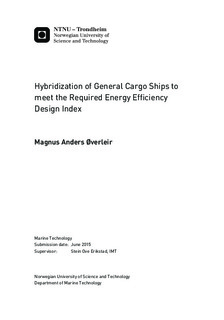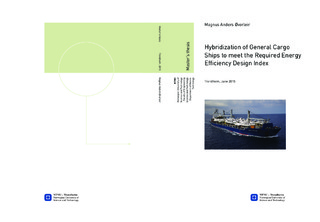| dc.description.abstract | In this thesis a hybrid propulsion system is proposed for a general cargo ship with the aim to meet the required Energy Efficiency Design Index (EEDI). The study has investigated how a hybrid propulsion system will influence the ship s EEDI value and fuel economy. The central problem is the coming challenge for the general cargo segment meeting the required efficiency value. Especially small vessels (3 000-15 000 DWT) with high speed will have troubles complying with the stricter regulations. This topic is highly relevant because of stricter regulations on ships energy efficiency and because hybrid technology has a large potential in the maritime industry.
The theme has been investigated throughout a systems study, assessing the advantages and disadvantages of a hybrid propulsion system. The technical and economical feasibility has been studied and a case has been performed to exemplify the hybrid propulsion system in general cargo ships. Based on the information obtained from the industry, a broad literature study and a case study, conclusions were drawn on the feasibility of the system.
The results of the study showed that it is fully possible to install a hybrid propulsion system in a general cargo vessel with the result of lowering the attained EEDI value. A hybrid battery system will increase the operational energy efficiency of a general cargo ship. Due to the lack of real ship operational data, some generalizations had to be made regarding values. The sizing of the battery was based on how much could be saved by installing a smaller main engine. Lithium-ion battery packs are the most fitting technology for the hybrid system. A high energy battery system with the ability to handle load variations is the most suiting for general cargo operation. It is also suggested that the cargo handling gear should be electric and served by the hybrid power system onboard. Based on the estimates of fuel reduction in the case study it will be economically feasible to install a hybrid system in small general cargo ship. | |

